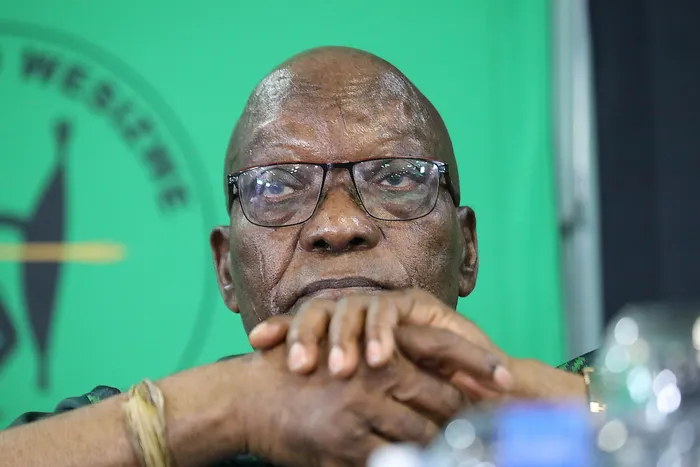Jacob Zuma and MK Party to contest Madlanga Commission's authority in court

Jacob Zuma and the uMkhonto weSizwe Party will on Thursday challenge the Madlanga Commission in the Pretoria High Court.
Image: Independent Media
The uMkhonto weSizwe Party (MKP) and Jacob Zuma will argue on Thursday before the Gauteng High Court, Pretoria, that the functions of the Madlanga Commission will usurp the powers that are constitutionally and exclusively conferred on both the Judicial Services Commission (JSC) and the Magistrates Commission.
In turning to the court in an urgent bid to interdict the commission, the applicants say it is not about challenging the decision to set up an inquiry per se. It is about the decision to set up a judicial commission of inquiry in the present circumstance where the subject matter of the inquiry includes serious allegations of criminality against unnamed members of the judiciary.
The judiciary cannot be both an accused institution and also the investigating institution via one of its members - Judge Mbuyiseli Madlanga - the applicants said in papers before the court.
They are expected to argue that the appointment of Justice Madlanga, a member of the judiciary, to investigate allegations involving the judiciary, violates the principle that no one may be a judge in their own cause.
The applicants highlighted that the terms of reference of the commission usurp the powers of constitutionally mandated bodies like the JSC and the Magistrates Commission, which are constitutionally and exclusively responsible for investigating judicial misconduct.
While challenging the establishment of the commission, Zuma and his party are also challenging the placement of police minister Senzo Mchunu on leave, and the appointment of Professor Firoz Cachalia to act in his place.
These decisions are unconstitutional, irrational, and violate the president's oath of office, the applicants say.
In July, President Cyril Ramaphosa announced the establishment of the judicial commission of inquiry to investigate allegations of criminal syndicate infiltration into South Africa's law enforcement, intelligence, and judicial systems.
These allegations were initially made public by KZN Provincial Commissioner Lieutenant General Nhlanhla Mkhwanazi during a media briefing. Mkhwanazi alleged collusion between politicians, law enforcement officials, prosecutors, and members of the judiciary with organized crime syndicates, including drug cartels.
In asking the court to stop the commission’s work, the MKP and Zuma argue that it is an extremely expensive mechanism, unlikely to yield binding outcomes or satisfy public demands for accountability.
The applicants say that while the Madlanga Commission is set down for six months, it is expected that this time period will be exceeded. In the interim, Mchunu will be on special leave. This will be at a cost that the South African taxpayer cannot afford, the applicants say.
According to the applicants, appointing a judge to investigate judicial misconduct is constitutionally inappropriate due to a clear or potential interest in the subject matter of the commission.
“The relevant subject matter of the inquiry falls within the exclusive jurisdiction of the JSC and Magistrate Court Commission. It falls outside of the jurisdiction of any other investigatory body or executive organ of state such as the Madlanga Commission,” they say.
Ramaphosa maintains that the Madlanga Commission has concurrent jurisdiction with the JSC. But the applicants argue that the Constitution provides that judicial officers are independent and subject only to the Constitution and the law.
According to the president, it is incorrect that the JSC and the Magistrate’s Commission have exclusive powers to investigate the allegations made by the commission.
It will be argued that the allegations made by Mkhwanazi do not identify specific individual judges or specific misconduct as specified in the JSC Act. Should specific conduct by identified judges come to light during the commission, they will be referred to the appropriate body, Ramaphosa says.
Cape Times
Related Topics: